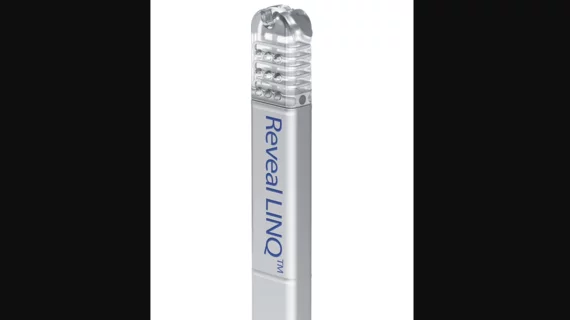Medtronic ICM a cost-effective approach for reducing the risk of ischemic stroke
Continuous monitoring with Medtronic’s Reveal Linq insertable cardiac monitor (ICM) is a cost-effective treatment option for ischemic stroke patients with large artery and small vessel disease, according to new data being presented at the 2024 International Stroke Conference in Phoenix.
The findings come from a new analysis the STROKE AF clinical trial, which compared the Reveal Linq ICM with typical care for a period of 12 months. Overall, treating patients with the ICM was associated with 53 fewer ischemic strokes per 1,000 patients compared to other typical treatments. The Medtronic ICM was also linked to a gain of 0.17 quality-adjusted life years (QALYs) at a cost of approximately $6,200, which translates to an incremental cost-effectiveness ratio of $37,760 per QALY. That ratio drops all the way to $22,016 per QALY, researchers added, when looking exclusively on high-risk patients.
Both of those figures are significantly lower than the established willingness-to-pay threshold of $150,000 per QALY.
“This analysis—coupled with the most recent publication of the ACC/AHA/ACCP/HRS guidelines for the diagnosis and management of AFib—reaffirm the importance of ICMs for the detection and management of AFib, which can impact secondary stroke prevention,” Stacey Churchwell, vice president and general manager of cardiovascular diagnostics and services business for Medtronic, said in a statement. “The Linq family of ICMs have not only demonstrated high sensitivity in detecting AFib compared to standard monitoring, but now have additional economic value data further strengthening their role in post-stroke care.”
“This economic value analysis demonstrates ICMs may be a highly cost-effective strategy for the prevention of recurrent stroke in patients with large artery and small vessel disease, with results similar to the cost analysis findings in the landmark CRYSTAL-AF study of cryptogenic stroke patients,” added Lee H. Schwamm, MD, associate dean of digital strategy and transformation for Yale School of Medicine, and senior vice president and chief digital health officer for Yale New Haven Health System.
Click here for more information about International Stroke Conference 2024, a three-day event hosted by the American Heart Association and American Stroke Association. This new analysis of STROKE AF data is scheduled to be presented to conference attendees on Friday, Feb. 9.

